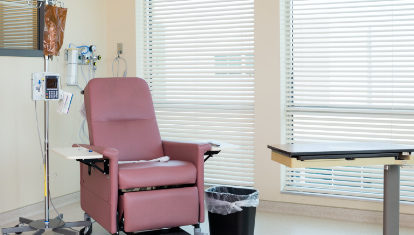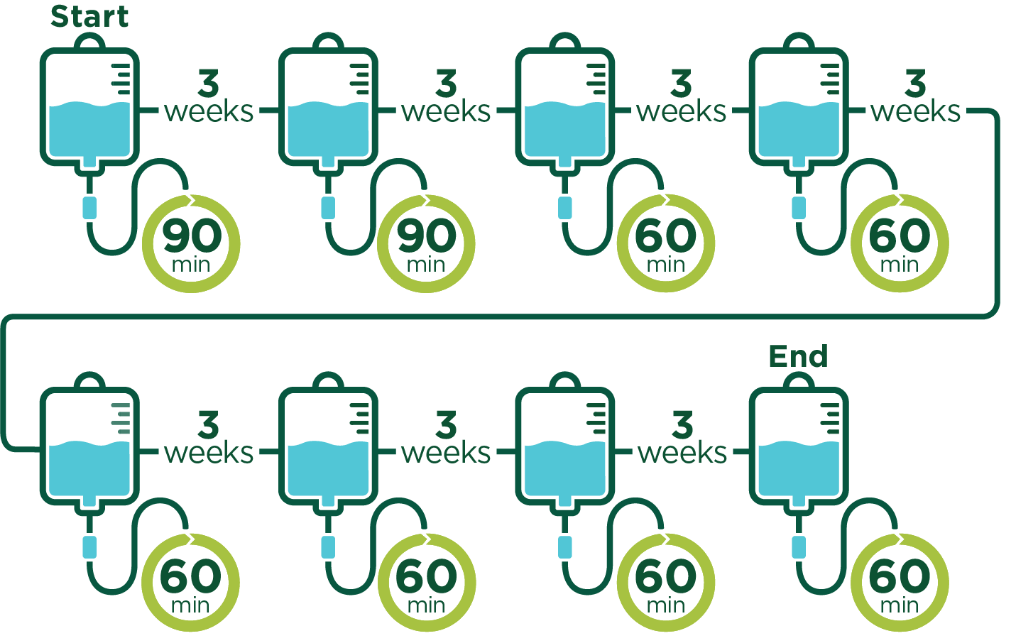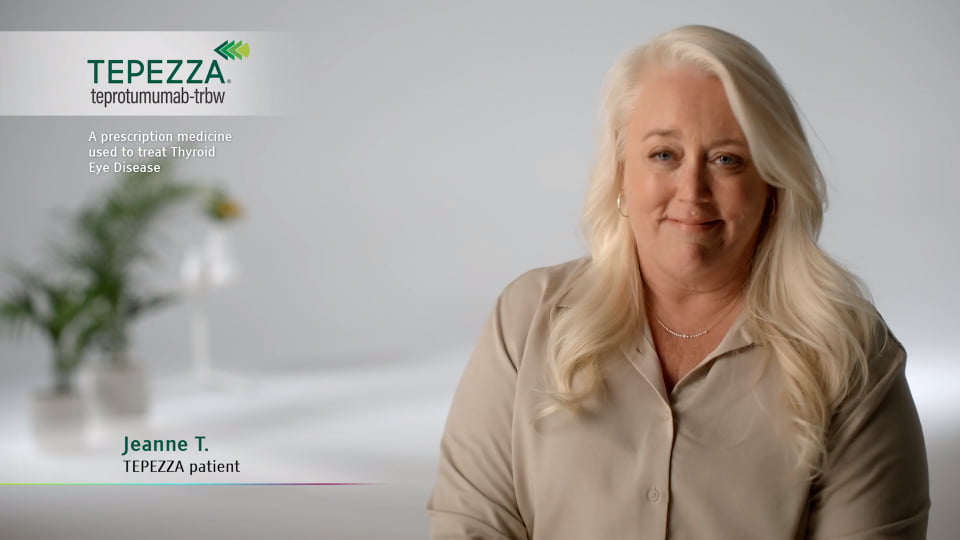


Questions about TED or TEPEZZA?
Call a Nurse Advocate at: 1-833-483-7399

Questions about TED or TEPEZZA?
Call a Nurse Advocate at: 1-833-483-7399
TEPEZZA is an IV (intravenous) medicine. This means it is delivered through a needle that is placed in your arm. IV medicines like TEPEZZA are most often given by registered nurses (RNs), nurse practitioners (NPs), or another medical professional. The process of delivering an intravenous, or "IV", medicine is called an infusion.

ANNOUNCER:
Understanding the TEPEZZA Infusion Process
Chapter 1: Introduction
NURSE:
Hi, my name is Stephanie Cooper and I'm a nurse practitioner. I work at an infusion center and I’m an expert at administering infusion medicines like TEPEZZA. Over the course of this video, I’m going to walk you through the infusion process for TEPEZZA, step-by-step. We’ll go over what the inside of an infusion center is like, what you can expect on infusion day, and more. So, let’s get started.
ANNOUNCER:
Chapter 2: Infusion and Infusion Centers
NURSE:
TEPEZZA is a special type of medicine called an IV, or intravenous medicine. This means TEPEZZA is given through a needle placed in your arm. The process of delivering an IV medicine into the body is called an infusion.
There are many kinds of medicines that are infused to treat a variety of conditions. And infused medicines may be more common than you think. In fact, some antibiotics are infused. Infused medications are also used to treat autoimmune conditions like Thyroid Eye Disease, Psoriasis, Rheumatoid Arthritis, Inflammatory Bowel Disease and others.
Because TEPEZZA is an infusion medicine, it is often given at a specialty clinic called an infusion center. An infusion center has the right equipment and skilled staff who specialize in administering infusions.
During your time at the infusion center, your main point of contact will likely be an infusion nurse, like me. My job is to infuse TEPEZZA and make my patients feel as comfortable as possible throughout the process.
Some infusion centers may seat patients in the same room. While others, like this one, may have private rooms for each patient. An infusion center is just one of many places you might go to get your TEPEZZA infusion.
Depending on your doctor, and your insurance provider, you may be able to receive a TEPEZZA infusion at your doctor’s office, a hospital, or at home.
ANNOUNCER:
Chapter 3: Getting Your TEPEZZA Infusion
NURSE:
When you arrive at the infusion center, the first thing you’ll do is check in at the front desk. After checking in and before starting the infusion we will check your weight and vitals.
Then, you’ll be taken to an infusion chair. The infusion chair is a lot like a recliner.
Once you sit down, you’ll want to go ahead and make yourself comfortable.
When it’s time to put in the IV, you’ll be asked to roll up your sleeve. As the IV goes in, you may feel a slight pinch. Once the IV is in, all you’ll have to do is sit back, relax, and let the medicine do its job.
Your infusion nurse may check in on you from time to time to monitor your vital signs like your temperature, heart rate, blood pressure, and blood glucose levels. They’ll also be checking to make sure you don't have any reactions to the medicine. If there is anything you need during your infusion, don’t hesitate to ask.
ANNOUNCER:
Chapter 4: Preparing for Your TEPEZZA Infusion
NURSE:
While your first 2 infusions will take about 90 minutes each, the total time you’ll spend at the infusion center may be between 2½ to 4 hours. This includes the time it takes to check in, as well as the time it takes for the infusion staff to prepare the medicine and monitor you for any reaction to your infusion of TEPEZZA.
Infusions 3 to 8 could be faster, taking about 60 minutes each, depending on your reaction to the infusion. Which means the total time you’ll spend at the infusion center may be between 1½ to 2½ hours.
Keep in mind that these are just estimates, and every patient’s experience is different. Your total time at the infusion center could be shorter or longer.
To help your TEPEZZA infusion go as smoothly as possible, there are some simple steps you can take to prepare, like confirming your appointment date, time, and address. Scheduling rides to and from your appointment, especially for your first infusion. Arriving about 20 minutes before your appointment to give yourself plenty of time to check in and take care of any details.
Packing an infusion care bag with things you may need to stay comfortable, like a book, movie, or music player to help you pass the time. Wearing a loose-fitting shirt that allows your infusion nurse to easily access your arm to take your vitals and insert the IV. And completing the “Before Infusion Reminder List” so you know you have all the details covered.
ANNOUNCER:
Chapter 5: After Your TEPEZZA Infusion
NURSE:
After 90 minutes, you’ll have finished your first TEPEZZA infusion. But before you leave the infusion center, there will be just a few more steps to take care of.
For starters, your infusion nurse will remove the IV. It will just take a second. Next, you’ll be monitored for a short time to make sure you don’t have a reaction to the infusion.
You can use this time to complete the “After Infusion Reminder List.” It will help you stay on track with treatment.
Once your infusion nurse gives you the OK, you’ll be cleared to go. Before you leave, schedule your next infusion for 3 weeks later.
ANNOUNCER:
Chapter 6: The Importance of Getting All 8 TEPEZZA Infusions
NURSE:
A full course of TEPEZZA treatment is 8 infusions. Each infusion is given once every 3 weeks. That means your treatment with TEPEZZA will take about 5 months.
Once you start to see results with TEPEZZA, it may be tempting to stop treatment. But for the best results, it’s recommended that you receive all 8 infusions as prescribed by your doctor.
Now that you know what to expect, I hope you’re feeling more comfortable with the TEPEZZA infusion process. Stay tuned to hear about support services available once your doctor has prescribed TEPEZZA. And don't forget to watch the important safety information at the end of the video.
ANNOUNCER:
CHAPTER 7: TEPEZZA Resources
Once you’ve been prescribed TEPEZZA, you can get one-on-one support by connecting with a Patient Access Liaison, or PAL for short. PALs can help you navigate the insurance process, explain cost assistance options, and help coordinate your infusions.
You can also sign up to get TEPEZZA and Thyroid Eye Disease resources that are right for you by visiting TEPEZZAsignup.com.
And for helpful ways to stay on track with your infusions, visit TEPEZZAresources.com.
USE
TEPEZZA is a prescription medicine used to treat Thyroid Eye Disease (TED), no matter if you’ve had TED for months or years.
What is the most important information I should know about TEPEZZA?
Infusion reactions can happen during or within 24 hours after your infusion of TEPEZZA. If you have a reaction while receiving TEPEZZA, your doctor or nurse will slow or stop your infusion and treat your reaction. If you have a severe infusion reaction, your doctor may stop your treatment completely.
Tell your doctor or nurse right away if you have any of these symptoms during or after your treatment with TEPEZZA:
If you have inflammatory bowel disease (IBD), such as Crohn’s disease or ulcerative colitis, TEPEZZA may make your IBD symptoms worse. Symptoms of worsening IBD may include: an increased number of loose stools with stomach pain or cramps, and blood in your stools. After each TEPEZZA infusion, tell your doctor right away if you have worsening IBD symptoms.
TEPEZZA may cause an increase in your blood sugar. Before starting treatment with TEPEZZA, tell your doctor if you are currently being treated for diabetes, know your blood sugar is high, or have been diagnosed with diabetes. It is important for you to take your treatments and follow an appropriate diet for glucose control as prescribed by your doctor.
TEPEZZA may cause severe hearing problems including hearing loss, which in some cases may be permanent. Tell your doctor if you have any signs or symptoms of hearing problems or changes in hearing.
Before receiving TEPEZZA, tell your doctor if you:
What are the possible side effects of TEPEZZA?
The most common side effects of TEPEZZA include muscle cramps or spasms, nausea, hair loss, diarrhea, feeling tired, high blood sugar, hearing problems, taste changes, headache, dry skin, weight loss, nail problems, and changes in menstruation.
This is not a complete list of all possible side effects. Tell your doctor or treatment team about any side effect you may have.
You are encouraged to report negative side effects of prescription drugs to the FDA. Visit www.fda.gov/safety/medwatch, or call 1-800-FDA-1088.
Please visit TEPEZZA.com for more information.
Treatment with TEPEZZA is 8 infusions. Each infusion is given 1 time every 3 weeks. That means the full course of treatment with TEPEZZA lasts about 5 months.

Your first and second infusions of TEPEZZA will last about 90 minutes each. Your remaining 6 infusions will take about 60 minutes each, but could be longer depending on how you react to the infusion.
The amount of TEPEZZA that you will receive during each infusion is based on how much you weigh at the time.

Karen: I was very scared at the beginning. I was very intimidated by needles but I knew that this was the course of action that I had to take to help me get better.
To avoid everything else that was on the road for me, such as the steroids and the surgery, the infusion didn't sound so bad and I'll be honest with you, my first encounter with the infusion center, I was very nervous when I initially got there. For me, it wasn't such a bad experience and three weeks later, I went back for the second and it was the same thing.
And at that point in time, you're there for a couple of hours so you're starting to talk to the people there. They become your family there. They would make me very comfortable. I didn't even think of it as, "Oh my gosh, I'm sitting here getting an infusion. This is terrible." I thought, "Hey, this isn't bad." They started testing my eyes and they were showing improvement.
INDICATION AND IMPORTANT SAFETY INFORMATION
USE
TEPEZZA is a prescription medicine used to treat Thyroid Eye Disease (TED), no matter if you’ve had TED for months or years.
IMPORTANT SAFETY INFORMATION
What is the most important information I should know about TEPEZZA?
Infusion reactions can happen during or within 24 hours after your infusion of TEPEZZA. If you have a reaction while receiving TEPEZZA, your doctor or nurse will slow or stop your infusion and treat your reaction. If you have a severe infusion reaction, your doctor may stop your treatment completely.
Tell your doctor or nurse right away if you have any of these symptoms during or after your treatment with TEPEZZA:
If you have inflammatory bowel disease (IBD), such as Crohn’s disease or ulcerative colitis, TEPEZZA may make your IBD symptoms worse. Symptoms of worsening IBD may include: an increased number of loose stools with stomach pain or cramps, and blood in your stools. After each TEPEZZA infusion, tell your doctor right away if you have worsening IBD symptoms.
TEPEZZA may cause an increase in your blood sugar. Before starting treatment with TEPEZZA, tell your doctor if you are currently being treated for diabetes, know your blood sugar is high, or have been diagnosed with diabetes. It is important for you to take your treatments and follow an appropriate diet for glucose control as prescribed by your doctor.
TEPEZZA may cause severe hearing problems including hearing loss, which in some cases may be permanent. Tell your doctor if you have any signs or symptoms of hearing problems or changes in hearing.
Before receiving TEPEZZA, tell your doctor if you:
What are the possible side effects of TEPEZZA?
The most common side effects of TEPEZZA include muscle cramps or spasms, nausea, hair loss, diarrhea, feeling tired, high blood sugar, hearing problems, taste changes, headache, dry skin, weight loss, nail problems, and changes in menstruation.
This is not a complete list of all possible side effects. Tell your doctor or treatment team about any side effect you may have.
You are encouraged to report negative side effects of prescription drugs to the FDA. Visit www.fda.gov/safety/medwatch, or call 1-800-FDA-1088.
Please visit TEPEZZA.com for more information.

Jeanne: So I went to my doctor and he told me about TEPEZZA. He told me that it was an infusion, that it was going to be eight infusions over 24 weeks, so once every three weeks. He explained that it's about a two-hour infusion the first time, and the next, subsequent infusions would be about an hour.
I'm a nurse, I do infusions all the time. So I didn't really think it was a big deal, but it was a little scary that I was going put something new into my body. And I was hopeful that it was going to work. So I was elated, I was elated when I got the call that I was going to be able to get TEPEZZA.
The surprise was actually how easy it was to get infused. I think that some people may have an issue, but the nurse started up the infusion and I didn't feel a thing. It was very comfortable, I was sitting in an infusion chair, very private, very comfortable. It was start an IV, get the infusion going, and you're out of the office. It was fabulous. I didn't schedule myself for work that night, and I didn't schedule myself for work the night after because I was thinking, "Okay, I don't know how this is going to go. I don't know if I'm going to have any side effects. Let's see how this works."
And every infusion I had, there was a little improvement with each subsequent infusion. I just found that my eyes were regressing: They weren't as proptotic as they were when I first started. My eyelids became kind of a normal-looking eyelid. I could feel the mobility of my eyes in the eye socket. I could feel less pressure from behind my eyes. They felt lighter. They felt free. And it just felt better and better with each subsequent infusion. It was the best feeling.
It's a hard diagnosis to have, it's hard to live with and to not have the heaviness behind your eyes, to not have the pain behind your eyes, to not have the itchiness, the bulgy red eyes. If I could sum up the entire infusion process in one word or phrase, I think I would say, "Illuminating, it was very illuminating."
INDICATION AND IMPORTANT SAFETY INFORMATION
USE
TEPEZZA is a prescription medicine used to treat Thyroid Eye Disease (TED), no matter if you’ve had TED for months or years.
IMPORTANT SAFETY INFORMATION
What is the most important information I should know about TEPEZZA?
Infusion reactions can happen during or within 24 hours after your infusion of TEPEZZA. If you have a reaction while receiving TEPEZZA, your doctor or nurse will slow or stop your infusion and treat your reaction. If you have a severe infusion reaction, your doctor may stop your treatment completely.
Tell your doctor or nurse right away if you have any of these symptoms during or after your treatment with TEPEZZA:
If you have inflammatory bowel disease (IBD), such as Crohn’s disease or ulcerative colitis, TEPEZZA may make your IBD symptoms worse. Symptoms of worsening IBD may include: an increased number of loose stools with stomach pain or cramps, and blood in your stools. After each TEPEZZA infusion, tell your doctor right away if you have worsening IBD symptoms.
TEPEZZA may cause an increase in your blood sugar. Before starting treatment with TEPEZZA, tell your doctor if you are currently being treated for diabetes, know your blood sugar is high, or have been diagnosed with diabetes. It is important for you to take your treatments and follow an appropriate diet for glucose control as prescribed by your doctor.
TEPEZZA may cause severe hearing problems including hearing loss, which in some cases may be permanent. Tell your doctor if you have any signs or symptoms of hearing problems or changes in hearing.
Before receiving TEPEZZA, tell your doctor if you:
What are the possible side effects of TEPEZZA?
The most common side effects of TEPEZZA include muscle cramps or spasms, nausea, hair loss, diarrhea, feeling tired, high blood sugar, hearing problems, taste changes, headache, dry skin, weight loss, nail problems, and changes in menstruation.
This is not a complete list of all possible side effects. Tell your doctor or treatment team about any side effect you may have.
You are encouraged to report negative side effects of prescription drugs to the FDA. Visit www.fda.gov/safety/medwatch, or call 1-800-FDA-1088.
Please visit TEPEZZA.com for more information.
Learn more about home infusion with TEPEZZA:



Learn more about preparing for your infusions.
Call a Nurse Advocate at 1-833-483-7399, Monday through Friday, 8AM to 8PM ET.
Nurse Advocates do not provide individual patient care or medical advice. After speaking with a Nurse Advocate, be sure to talk with your doctor about your treatment options, including TEPEZZA.
Infusion reactions can happen during or within 24 hours after your infusion of TEPEZZA. If you have a reaction while receiving TEPEZZA, your doctor or nurse will slow or stop your infusion and treat your reaction. If you have a severe infusion reaction, your doctor may stop your treatment completely.
If you have inflammatory bowel disease (IBD), such as Crohn's disease or ulcerative colitis, TEPEZZA may make your IBD symptoms worse. Symptoms of worsening IBD may include: an increased number of loose stools with stomach pain or cramps, and blood in your stools. After each TEPEZZA infusion, tell your doctor right away if you have worsening IBD symptoms.
TEPEZZA may cause an increase in your blood sugar. Before starting treatment with TEPEZZA, tell your doctor if you are currently being treated for diabetes, know your blood sugar is high, or have been diagnosed with diabetes. It is important for you to take your treatments and follow an appropriate diet for glucose control as prescribed by your doctor.
TEPEZZA may cause severe hearing problems including hearing loss, which in some cases may be permanent. Tell your doctor if you have any signs or symptoms of hearing problems or changes in hearing.
The most common side effects of TEPEZZA include muscle cramps or spasms, nausea, hair loss, diarrhea, feeling tired, high blood sugar, hearing problems, taste changes, headache, dry skin, weight loss, nail problems, and changes in menstruation.
This is not a complete list of all possible side effects. Tell your doctor or treatment team about any side effect you may have.
TEPEZZA is a prescription medicine used to treat Thyroid Eye Disease (TED), no matter if you’ve had TED for months or years.
P-TEP-US-00841-3 07/23
Infusion reactions can happen during or within 24 hours after your infusion of TEPEZZA. If you have a reaction while receiving TEPEZZA, your doctor or nurse will slow or stop your infusion and treat your reaction. If you have a severe infusion reaction, your doctor may stop your treatment completely.
If you have inflammatory bowel disease (IBD), such as Crohn's disease or ulcerative colitis, TEPEZZA may make your IBD symptoms worse. Symptoms of worsening IBD may include: an increased number of loose stools with stomach pain or cramps, and blood in your stools. After each TEPEZZA infusion, tell your doctor right away if you have worsening IBD symptoms.
TEPEZZA may cause an increase in your blood sugar. Before starting treatment with TEPEZZA, tell your doctor if you are currently being treated for diabetes, know your blood sugar is high, or have been diagnosed with diabetes. It is important for you to take your treatments and follow an appropriate diet for glucose control as prescribed by your doctor.
TEPEZZA may cause severe hearing problems including hearing loss, which in some cases may be permanent. Tell your doctor if you have any signs or symptoms of hearing problems or changes in hearing.
The most common side effects of TEPEZZA include muscle cramps or spasms, nausea, hair loss, diarrhea, feeling tired, high blood sugar, hearing problems, taste changes, headache, dry skin, weight loss, nail problems, and changes in menstruation.
This is not a complete list of all possible side effects. Tell your doctor or treatment team about any side effect you may have.
TEPEZZA is a prescription medicine used to treat Thyroid Eye Disease (TED), no matter if you’ve had TED for months or years.
P-TEP-US-00841-3 07/23